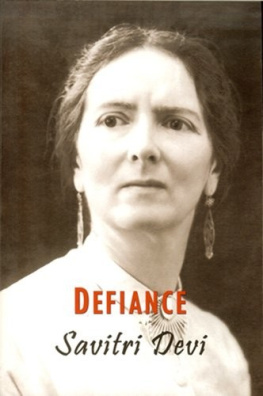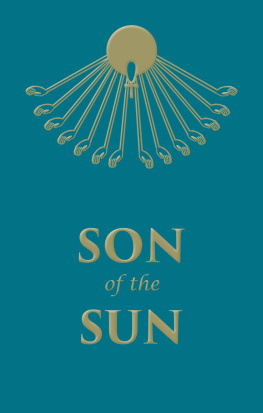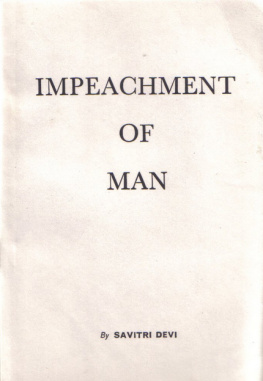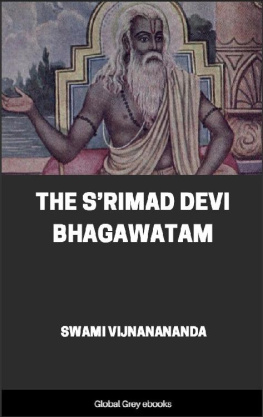 DEFIANCE by Savitri Devi Calcutta 1951 DEDICATED TO MY BELOVED COMRADE AND FRIEND HERTHA EHLERT L AND TO ALL THOSE WHO SUFFERED FOR THE LOVE OF OUR FHRER, FOR THE GREATNESS OF HIS PEOPLE, AND FOR THE TRIUMPH OF THE EVERLASTING TRUTH FOR WHICH HE AND THEY HAVE FOUGHT TO THE BITTER END Taking as equal pleasure and pain, gain and loss, victory and defeat, gird thyself for the battle; thus thou shalt not incur sin. The Bhagavad-Gta (II. Verse 38) p Allein unser Denken and Handeln soil keineswegs von Beifall oder Ablehnung unserer Zeit bestimmt werden, sondern von der bindenden Verpflichtung an eine Wahrheit, die wir erkannten. Adolf Hitler ( Mein Kampf, II, Chap. 2, edit 1939, p. vii
DEFIANCE by Savitri Devi Calcutta 1951 DEDICATED TO MY BELOVED COMRADE AND FRIEND HERTHA EHLERT L AND TO ALL THOSE WHO SUFFERED FOR THE LOVE OF OUR FHRER, FOR THE GREATNESS OF HIS PEOPLE, AND FOR THE TRIUMPH OF THE EVERLASTING TRUTH FOR WHICH HE AND THEY HAVE FOUGHT TO THE BITTER END Taking as equal pleasure and pain, gain and loss, victory and defeat, gird thyself for the battle; thus thou shalt not incur sin. The Bhagavad-Gta (II. Verse 38) p Allein unser Denken and Handeln soil keineswegs von Beifall oder Ablehnung unserer Zeit bestimmt werden, sondern von der bindenden Verpflichtung an eine Wahrheit, die wir erkannten. Adolf Hitler ( Mein Kampf, II, Chap. 2, edit 1939, p. vii
PART ONE
Triumph
Chapter I The Empty Train ............ vii
PART ONE
Triumph
Chapter I The Empty Train ............
Chapter II The Arrest ..................... 10 Chapter III Questions and Answers ... Chapter IV On Remand .................. 94 Chapter V The Glorious Day ......... 191
PART TWO
Whispers
Chapter VI The Doors Close .......... 258 Chapter VIII Clandestine Conversations ... 321 Chapter IX More Secret Joys ......... 371
PART THREE
Silence
Chapter X The Search .................... 401 Chapter XI Anguish ....................... 425 Chapter XII The Way of Absolute Detachment . 487 Chapter XIII We shall begin again ..... 522 Epilogue ...... 576 vii
FOREWORD This book is merely an account of my arrest and trial, in western occupied Germany, in early 1949, on the charge of Nazi propaganda, and of my subsequent life in jail. 576 vii
FOREWORD This book is merely an account of my arrest and trial, in western occupied Germany, in early 1949, on the charge of Nazi propaganda, and of my subsequent life in jail.
The glimpse one gets, in it, of western occupied Germany, is a glimpse of Germany through my eyes, i.e., through the eyes of a non-German follower of Adolf Hitler. The impression that the representatives of the Occupying Powers might have of the same country from their angle, is probably quite different. God alone knows and time alone will tell which is the nearest to objective reality. In the meantime, should this book come to light before what I call our Day on no consideration should the opponents of the Nazi faith, now in a position to harm them, incriminate any Germans on the ground of my personal impressions, or of words which I might have reported more or less accurately. I have named no Germans in this book, save one, whom I know now to be dead, and to whom, consequently, the champions of Democracy can do no longer any harm. But several might be recognisable by the posts they held at the time of my imprisonment.
What I have just said applies to them: I do not want them to be implicated on account of my impression about them. I thank them however for having given me that impression; for whether true or exaggerated, it has strengthened my confidence in the people whom I call in this book (and in another) the vanguard of the regenerate Aryan race, and thereby helped me to find life worth living, even now, in our gloomy times. Lyons (France), the 29th August, 1950 SAVITRI DEVI
PART I
TRIUMPHCHAPTER I
THE EMPTY TRAIN I have some papers here,... dangerous ones; would you like to see them? said I to the tall and handsome young German walking by my side along the underground passage that led to the platform from which I was to take my train, in the station of Cologne, the night between the 13th and 14th of February 1949. I had met the man a few hours before, at the Catholic Mission of the same station, and we had talked enough for him to become convinced that he could trust me, as I could trust him to say the least. He stopped for half a second and looked around to see if anybody was following us, or if any passerby could possibly have overheard my words.
But we were the only people in the long, gloomy corridor. The young man turned to me and answered in a low voice: Yes; give me one. I pulled a poster twice folded in four out of my pocket and put it into his hand. Dont stop to read it now, said I, but wait till we get into the train, and then go and read it in the toilet, where nobody can come and disturb you. You have heaps of time. See if you think such papers can be useful, and tell me so quite frankly.
If you want more, I still have plenty left. The young man hid the precious paper in the inner pocket of his coat and continued to walk by my side in silence, helping me to carry the little luggage I had. We reached the platform. The train was there, practically empty, for it was not to start till an hour later, at 1:12, if I remember well. A fierce wind was blowing. And it was bitterly cold.
The young man helped me to lift my suitcase into the railway carriage and then stepped in himself, and went to read the poster in the best hiding place, as I had suggested. The words he read, written in large capital letters below a black swastika that covered about one third of the page, were the following: GERMAN PEOPLE, WHAT HAVE THE DEMOCRACIES BROUGHT YOU? IN WAR TIME, PHOSPHORUS AND FIRE. AFTER THE WAR, HUNGER, HUMILIATION, OPPRESSION; THE DISMANTLING OF THE FACTORIES; THE DESTRUCTION OF THE FORESTS; AND NOW, THE RUHR STATUTE! HOWEVER, SLAVERY IS TO LAST BUT A SHORT TIME MORE. Our Fhrer is alive AND WILL SOON COME BACK, WITH POWER UNHEARD OF. RESIST OUR PERSECUTORS! HOPE AND WAIT. i. e., with my own initials. e., with my own initials.
The young German came out of his corner. There was a strange light in his bright grey eyes and a strange assertiveness in his voice. Give me as many of these posters as you have. I shall stick them up for you! said he. He was no longer the lonely, hungry, dreary prisoner of war who had just returned home after four long years of all manner of ill-treatment at the hands of Germanys enemies. He had become once more the soldier of a victorious Germany of an invincible Germany and the herald of Hitlers eternal Idea; once more his old self, that nothing could kill.
I admired him, and recalled in my mind the words I had once heard in a village in Saarland, some six months before, from another sincere National Socialist: We are waiting for the spark. Could it be that I was something of a spark a spark of faith and hope in the midst of the unending gloom of the present day? As that thought entered my consciousness, tears came to my eyes, and a thrill of immense elation ran through my body and seemed to lift me above myself. Through the windows of the train, I could see, in the dim artificial light, the torn outlines of what had once been a wall ruins, nothing but ruins wherever one sets ones eyes in unfortunate Germany; the torn and prostrate body of Hitlers martyred country. But before me, against that background of desolation, stood the young man (he could not have been more than thirty) fifteen times wounded on the battlefield for the cause of the New Order; over three years a prisoner of the French in a slave labour camp in the burning heart of Africa, under the whip of African auxiliaries; hungry; without work; apparently without a future (he had told me of his plight) but now erect and hopeful, once more aware of his invincibility. The German soul gleamed, more alive than ever, in his sparkling eyes a tangible reality and addressed me through his voice. I. I.
He gazed at me, visibly moved. You, said he; you, a foreigner! I, an Aryan, and a National Socialist, I replied. No Aryan worthy of the name can forget his debt of gratitude to the Fhrer the Saviour of the whole race and to Germany who now lies in ruins for having fought for the rights, nay, for the very existence of superior mankind. My answer, which bore the accent of sincerity, seemed to please him. But he did not comment upon it. He only asked me a few questions.
Next page










 DEFIANCE by Savitri Devi Calcutta 1951 DEDICATED TO MY BELOVED COMRADE AND FRIEND HERTHA EHLERT L AND TO ALL THOSE WHO SUFFERED FOR THE LOVE OF OUR FHRER, FOR THE GREATNESS OF HIS PEOPLE, AND FOR THE TRIUMPH OF THE EVERLASTING TRUTH FOR WHICH HE AND THEY HAVE FOUGHT TO THE BITTER END Taking as equal pleasure and pain, gain and loss, victory and defeat, gird thyself for the battle; thus thou shalt not incur sin. The Bhagavad-Gta (II. Verse 38) p Allein unser Denken and Handeln soil keineswegs von Beifall oder Ablehnung unserer Zeit bestimmt werden, sondern von der bindenden Verpflichtung an eine Wahrheit, die wir erkannten. Adolf Hitler ( Mein Kampf, II, Chap. 2, edit 1939, p. vii
DEFIANCE by Savitri Devi Calcutta 1951 DEDICATED TO MY BELOVED COMRADE AND FRIEND HERTHA EHLERT L AND TO ALL THOSE WHO SUFFERED FOR THE LOVE OF OUR FHRER, FOR THE GREATNESS OF HIS PEOPLE, AND FOR THE TRIUMPH OF THE EVERLASTING TRUTH FOR WHICH HE AND THEY HAVE FOUGHT TO THE BITTER END Taking as equal pleasure and pain, gain and loss, victory and defeat, gird thyself for the battle; thus thou shalt not incur sin. The Bhagavad-Gta (II. Verse 38) p Allein unser Denken and Handeln soil keineswegs von Beifall oder Ablehnung unserer Zeit bestimmt werden, sondern von der bindenden Verpflichtung an eine Wahrheit, die wir erkannten. Adolf Hitler ( Mein Kampf, II, Chap. 2, edit 1939, p. vii